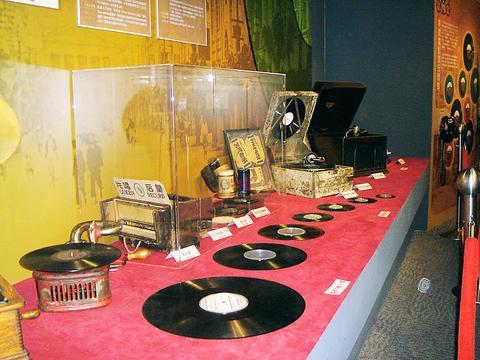Until the early 1980s, Taiwanese songs that criticized the government were blacklisted. A thick, black-ink marker was used to cover up the song title and the producer was fined. Case closed.
Fortunately, one such record entitled Unchanging Love (

PHOTO: CHRIS FUCHS, TAIPEI TIMES
The exhibition, The Song, Taipei and Me, is contained within one room on the second floor of Taipei City Hall. Although rich in explanations about the development of popular music in Taiwan, the exhibit's content is somewhat difficult to grasp, unless of course you either grew up here or are an expert in the subject.
The Song, Taipei and Me is arranged chronologically, first grounding Taiwan's musical history in the folk songs sung by Aborigines, Hakkas and Minnan people. It wasn't until 1932, however, that Taiwan made its mark on the pop music map, when a Taiwanese song was used in a slient movie filmed in Shanghai titled Sobbing Peach Blossoms, said Yang Mei-Jen, a spokeswoman for the center.
Before 1945, during Japanese rule, the content of music was strictly controlled. The use of Chinese characters was forbidden and it was required that Japanese song melodies be used together with Taiwanese lyrics.
In fact, it wasn't until after Japan ceded control of Taiwan in August 1945 and the Chinese Nationalist Party (KMT) moved to Taipei that Mandarin songs first found their way into Taiwan's music market.
From then on, the island's musical industry blossomed. During the 1940s, for instance, Danshui -- the Ximending of that era -- became a mecca for pop music lovers. For the price of a cheap cup of tea, anyone could lounge on a bamboo bench alongside the Danshui river and listen to Taiwanese songs well into the night.
Interestingly enough, Danshui some 30 years later gave rise to a musical movement called "Campus Songs," after one artist, Li Shuang-ze (
Later, these "Campus Songs," whose lyrics stressed sincerity and inner peace, became popular not only among college students but also among the general public.
The chronology ends with the present state of pop-music in Taiwan, detailing how TV and radio helped popularize music during the 1960s and 1970s. It also briefly cites current musical talents like the LA Boyz, a group composed of three US-born Taiwanese brothers, and Tokyo D, a Japanese singer.
Most of the exhibition props consist of records and record players, relics that are standard fare and not very captivating. There are, however, a number of songs you can listen to, which should help put the different music genres into perspective.
There is also a clip of the movie Sobbing Peach Blossoms that can be viewed while listening to the soundtrack.
On the whole, The Song, Taipei and Me succeeds in proving that Taiwan in general, and Taipei more specifically, has a rich musical history.
Exhibition notes:
What: The Song, Taipei and Me (歌我台北)
Where: Discovery Center of Taipei (台北探索管) 1 Shifu Rd, Taipei (臺北市市府路一號)
When: Now until Oct. 10
Hours: Tuesday to Sunday, 9am to 5pm
Tickets: Free admission

The Democratic Progressive Party (DPP), Chinese Nationalist Party (KMT), and the country’s other political groups dare not offend religious groups, says Chen Lih-ming (陳立民), founder of the Taiwan Anti-Religion Alliance (台灣反宗教者聯盟). “It’s the same in other democracies, of course, but because political struggles in Taiwan are extraordinarily fierce, you’ll see candidates visiting several temples each day ahead of elections. That adds impetus to religion here,” says the retired college lecturer. In Japan’s most recent election, the Liberal Democratic Party lost many votes because of its ties to the Unification Church (“the Moonies”). Chen contrasts the progress made by anti-religion movements in

Taiwan doesn’t have a lot of railways, but its network has plenty of history. The government-owned entity that last year became the Taiwan Railway Corp (TRC) has been operating trains since 1891. During the 1895-1945 period of Japanese rule, the colonial government made huge investments in rail infrastructure. The northern port city of Keelung was connected to Kaohsiung in the south. New lines appeared in Pingtung, Yilan and the Hualien-Taitung region. Railway enthusiasts exploring Taiwan will find plenty to amuse themselves. Taipei will soon gain its second rail-themed museum. Elsewhere there’s a number of endearing branch lines and rolling-stock collections, some

Last week the State Department made several small changes to its Web information on Taiwan. First, it removed a statement saying that the US “does not support Taiwan independence.” The current statement now reads: “We oppose any unilateral changes to the status quo from either side. We expect cross-strait differences to be resolved by peaceful means, free from coercion, in a manner acceptable to the people on both sides of the Strait.” In 2022 the administration of Joe Biden also removed that verbiage, but after a month of pressure from the People’s Republic of China (PRC), reinstated it. The American

Chinese Nationalist Party (KMT) legislative caucus convener Fu Kun-chi (傅?萁) and some in the deep blue camp seem determined to ensure many of the recall campaigns against their lawmakers succeed. Widely known as the “King of Hualien,” Fu also appears to have become the king of the KMT. In theory, Legislative Speaker Han Kuo-yu (韓國瑜) outranks him, but Han is supposed to be even-handed in negotiations between party caucuses — the Democratic Progressive Party (DPP) says he is not — and Fu has been outright ignoring Han. Party Chairman Eric Chu (朱立倫) isn’t taking the lead on anything while Fu